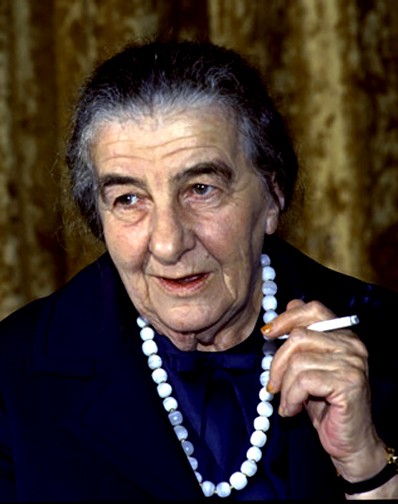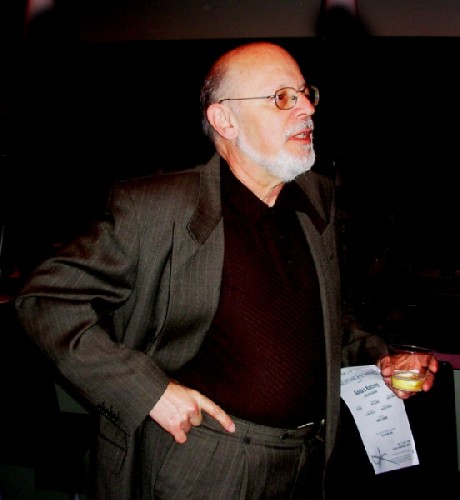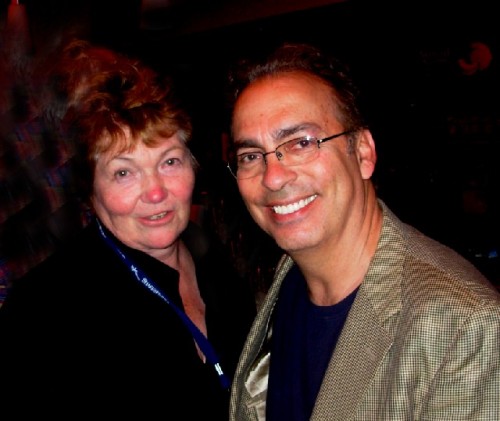Golda's Balcony with Annette Miller
Shakespeare & Company Completes Its Diva Series Trilogy
By: Charles Giuliano - Jun 18, 2009
Diva: A prima donna, the principal female singer of an opera company. A principal female in some other field such as a prima ballerina. Any female celebrity, usually a well known pop singer. A person who considers herself (or by extension himself) much more important than others, has high expectations of others and becomes angry when their standards or demands are not met
Etymology: From divaItalian, diva ("diva, goddess"), from Latin divaLatin, diva ("goddess"), female of divus ("divine, divine one").
Golda's Balcony
By William Gibson
The Diva Series
Directed by Daniel Gidron; Set Designer, Kiki Smith; Lighting designer, Greg Solomon; Costume Designer, Govane Lohbauer; Sound Designer, Michael Pfeiffer; Stage Manager, Meredyth Pederson; Starring Anette Miller
Elayne P. Bernstein Theatre, Shakespeare & Company, Lenox, Mass.
June 17 to July 3, and September 13, 2009
Last night, Shakespeare & Company launched the anchor leg of its three, one woman plays in the Diva Series. "Golda's Balcony" by William Gibson, starring Annette Miller, follows "Shirley Valentine" featuring the founder of the Lenox based company, Tina Packer, and "The Actors Rehearse the Story of Charlotte Salomon" which starred Penelope Kreitzer. The current one act play runs through July 3 and all three plays will return for one night each in September.
With just a few performances each the Diva Series says a lot about Shakespeare & Company. In addition to its mandate to present works by the Bard, and to train actors in traditional techniques, there is also a commitment to signature productions, such as Packer in "Shirley Valentine" and to develop new works initiating as readings and then taken through stages to emerge as plays. "Golda"s Balcony" was essentially a rewrite of Gibson's "Golda" which closed in 1977 after a brief Broadway run starring Anne Bancroft, directed by Arthur Penn. "Golda's Balcony" premiered at Shakespeare & Company in 2002. It then traveled to Boston where Miller won the prestigious Elliot Norton Award for her performance. The production returns to Lenox with a more ambitious production (sets, lights, sound design) than was possible in its premiere at The Mount. "Charlotte Salomon" was given its recent world premiere by S&Co.
Such ambition and commitment is remarkable particularly in what will be a challenging season for the arts. As Packer has stated repeatedly S&Co will work itself out of adversity by staging a record number of productions. The company is presenting some 18, of which we have now covered four, between now and mid winter. In this time span Packer, and the new Artistic Director, Tony Simotes, hope to complete a drive for $10 million to retire a debt assumed to develop the Elayne P. Bernstein Theatre which is now in its first full season.
While Packer and Simotes are sanguine about the future of the company they face a daunting task. Last week when we attended "Charlotte Salomon" there was a small audience. Last evening, opening night, it was disappointing to see so many empty seats. It may be a combination of very tough material, the last play focused on the Holocaust, and the current play deals with the struggles of Israel, as well as, the economy.The public is being more selective with their entertainment dollars. By contrast, Packer's performance as the hilarious "Shirley Valentine" had enormous popular appeal.
A compelling argument may be made that all three performers in the Diva Series- Tina Packer, Penelope Kreitzer, and Annette Miller- have been masterful if not magnificent. They represent three truly amazing artists portraying remarkable women. It has been powerful and riveting to attend these performances from the hilarious "Valentine," to the harrowing and taxing "Salomon," to a poignant and insightful "Golda." It has represented great theatre as well as a case study of women in one person roles. This has allowed us to experience aspects of the craft in depth. All three performances will be candidates for end of the season awards. But nobody says this is easy. The last two plays have been as tough on audiences as they have been demanding on the artists.
Miller walked on stage barefooted and looking frumpy to a fault. It was hard to find anything womanly under that schmatta of an outfit (a non descript beige skirt with knit short sleeved top and matching jacket). She announced to us that there is no nose prosthesis (Golda had quite a proboscis), wig, or swollen legs. That said she slouched into an aged Golda who was 75 during the Yom Kippur War of 1973 which forms the time frame of the play.
She was born Golda Mabovitch, on 3 May, 1898. She was known as Mrs. Myerson, from 1917-1956. Becoming Golda Meir (under orders from Prime Minister David Ben-Gurion to take a Hebrew name). Golda was never much of a looker. She died of cancer in 1978 four years after resigning as Israel's fourth Prime Minister (1969-1974).
Given her matronly appearance and demeanor (Golda allegedly made chicken soup for her soldiers) we were surprised to learn of numerous affairs. Her marriage to Morris, a sign painter, which produced two children, ended in divorce. She was evidently a more effective politician than mother and wife. Sadly, she states in the play "I ruined his life." They married in 1917. At her insistence they settled in Palestine in 1921 where, for a time, they lived on a Kibbutz.
Given the "bare pipe" policy of S&Co, with several plays in simultaneous production, the set by Kiki Smith is minimal but appropriate. There is a kind of ersatz "brickmaster" masonry wall, all too obviously a veneer, at the back of the stage.. On that is hung a large map of Israel to which Gold refers. There are three basic settings of action and lighting. One area entails her desk and that most essential prop, a phone. Here she conducts business. On the other side of the stage is a living room with a large generic arm chair. In between is a podium from which she made speeches and addressed Knesset. The lighting by Greg Solomon is not always effective in isolating the action. While she is in the office, for example, the rest of the set remained fully illuminated.
The use of sound by Michael Pfeiffer, however, was emotive. From time to time there was scratchy classical music which she demanded be turned off. This "annoyance" signified the beloved 78's of her husband Morris that he took with him from America. It just irritated Golda who had no patience for anything but politics. It became a nice device to signify their troubled marriage.
To further accent these shifts of scene and mood the director, Daniel Gidron, has her constantly taking on and off her jacket which is often draped over the back of an office chair. There is another essential prop, a large, generic hand bag. These props, and the ultra baggy costume by Govane Lohbauer, effectively beg the question of how such a frumpy, matronly, housewife, "Mrs. Meir," got to be one of the most powerful women in the world. Not only did she send young people to war, in the ultimate theme of the play, she had her finger on the hair trigger of nuclear arms. This was coded as Temple Bombs in reference to staving off the third destruction of the Temple of Jerusalem.
Faced with the imminent destruction of Israel much of the action of the play revolves around a desperate, late night Cabinet meeting. The war is going badly. Russian missiles have knocked out a tenth of the air force. Israel's tanks are massively outnumbered on the Syrian and Egyptian borders. President Nixon has promised arms that are yet to be delivered. Time is running out. We keep hearing a ticking clock. There is a terrifying debate about whether to save the nation by evoking Armageddon in the form of nuclear strikes against Egypt and Syria. It was the threat of those bombs, which may have resulted in a chain reaction that launched World War Three. That desperate possibility proved to be the leverage that motivated the United States to rescue Israel from certain annihilation.
Rather early on in the history of Israel it was discovered that the barren land contained uranium ore. In 1957, deep underground at a site called Dimona, with the assistance of France, Israel constructed a nuclear reactor. Meir proved to be such a frequent visitor to the reactor that the platform from which she observed came to be known as "Golda's Balcony." The other balcony in the play is the view of the Mediterranean from her home. When the Bomb was developed by Israeli scientists the text "Never Again" was painted on its tip. Meir was apparently well versed on weapons and defense systems.
Six hours before the Yom Kippur War, when Syrian and Egyptian forces were massing on the borders, Meir met with her Cabinet. Minister of Defense, Moshe Dayan, argued that war was unlikely while General David Elazar advised a pre-emptive strike. Meir felt that a first strike by Israel would portray them as aggressors. There was the delicate balance of the Cold War to consider. During the night, through the Israeli ambassador in Washington, there were constant calls to reach and appeal to Henry Kissinger. He told her "First I am an American, second I am Secretary of State, and third I am a Jew." To which her response was that in Hebrew "We read from right to left."
During that terrible night, with the fate of not just Israel, but the world in balance, Golda tells us the story of her life. The challenge for the actress, Miller, and director, Gidron, is to navigate between past and present. Thus all that taking off and putting on of the jacket and shifts around the set- office, living room, podium- as a complex, multi valent, narrative unfolds.
The sweep of history that Golda relates stretches from the destruction of the Second Temple of Jerusalem, under the Roman Emperor Titus, in 70 BC, and the later fall of Masada in 73 BC, to the resultant Diaspora. As a young girl in America she was caught up in the cause of Zionism that culminated in the creation of the state of Israel ending the British mandate, on May 14, 1948.
The new nation of 700,000 Jews, armed with just 10,000 rifles, faced certain destruction when attacked by five surrounding Arab nations. On May 10, just days before the U.N. resolution went into effect, Meir traveled to Amman, disguised as an Arab woman, for secret meetings with King Abdullah of Transjordan. Based on a prior agreement she urged him not to attack. The King suggested that Israel be annexed to his kingdom. Jews would be allowed to sit in his Parliament. He asked her to "be patient and wait a while longer." To which she sharply replied "We have waited 2,000 years."
The play reveals that she saved the new nation from certain destruction by touring the US and raising some $50 million for defense. Having survived that initial crisis the population doubled through global immigration in just a few years. The new settlers made the desert bloom. But even now, some 61 years later, the conflict between Israel and the Palestinians remains unresolved.
The challenge of this drama is to find a balance between a historic polemic, agit-prop, told entirely from the position of a Zionist leader, and an attempt to humanize her. It is an engaging tale of a woman who had the authority and power to launch World War Three, blackmailed the US into providing support, as well as, the warmth to make a sandwich for visiting dignitaries. She saved her nation and carved a niche in history but at the cost of a failed marriage and neglected children. Of course these are denunciations that are never leveled against male leaders. This is just one of the many points nailed home by the Diva series.
Exiting the stage before a standing ovation from the audience Miller/ Golda repeated several times the soft mantra "Shalom, Shalom, Shalom." How similar the Hebrew word for peace "Shalom" is to the Arabic "Salaam." It all started, as Golda put it, when "Abraham fooled around with the maid." He produced two sons, Ishmael, with the servant Hagar, and Isaac, by his wife, Sarah. Abraham descended from Shem, the blessed of Noah's three sons. Hence Semites: The people of the Book. From Ishmael came the Muslims, and from Isaac the Jews. Shalom/ Salaam.












